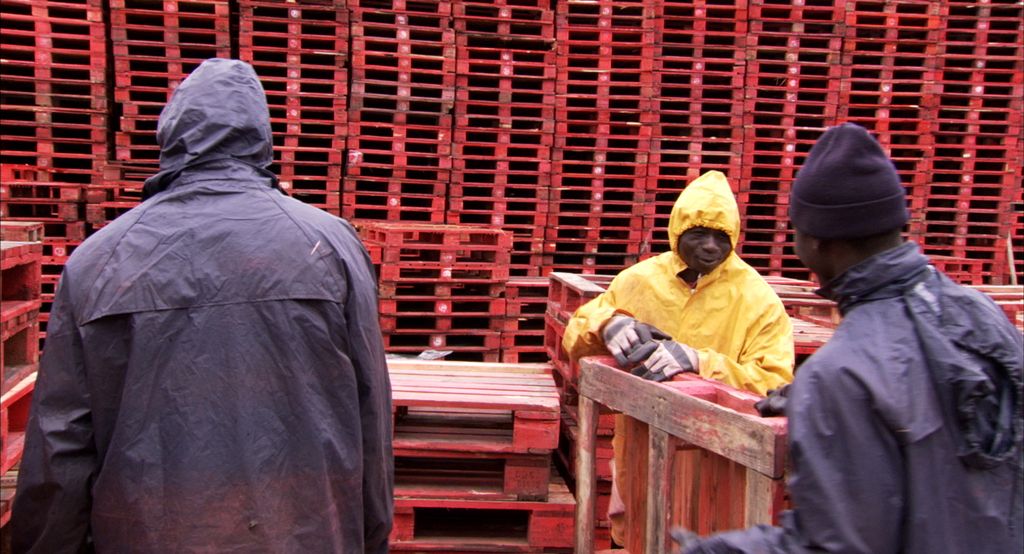Dernier maquis – Amidst the forklifts
Rabah Ameur-Zaïmeche is one of the most original Maghrebian cinematic voices to appear in the past couple of decades. Although he has directed a single film in the area – the wonderful Bled Number One (2006), which tells the story of a wayward son returning from Europe back to his Algerian village – Ameur-Zaïmeche has, in time, constructed an oeuvre that is dotted with echoes of this double culture, giving birth to a proteiform space which is both phantasmatic and heavily rooted in the multicultural realities of contemporary France. The director’s debut was the 2003 feature Wesh wesh, qu’est-ce qui se passe?, a “suburban” film that is angry and violent, as seen through the eyes of an Arab community that has already grown beyond the first generation of children born on French soil. Ever since then, Ameur-Zaïmeche has experimented by revisiting the final days of Jesus Christ (Histoire de Judas, 2015), which resulted in a film that is not inasmuch flippant, but which is still somehow closer to being a sample of slow cinema that pays close attention to the surrounding space and with the visages that inhabit it, rather than being preoccupied with Christian exaltation, which is heavily deflated. Set in the near future, his most recent effort, Terminal Sud (2018), starring Ramzy Bédia as the lead character, imagines an eerie Arabic-French state, a territory caught in the mires of civil war, in which everything is bathed in the burnt, sickly lights of a merciless Mediterranean sun.
Dernier maquis (2008) is probably Ameur-Zaïmeche’s most radical film yet, the one where the story slowly fades away and takes on the role of a political fable. But, if the film is indeed political, its thesis can only be spotted in its constantly winding paths, since the filmmaker isn’t willing to sacrifice not even a bit of the richness of human gestures, of his predilection towards observing collective rituals, of his fine translation of the difficult interactions between various social groups, and so on. All of this makes Dernier maquis a very dense film, with a wonderful texture of details that compose the overall mise-en-scene, to the same degree to which, from a formal point of view, this is a film that is very clear and straight-forward. After all, this is something that is striking about all of Ameur-Zaïmeche’s films: the wholly intuitive manner in which the plot moves forward, without having to necessarily reach a given endpoint, allowing itself short moments of disconnect, in which the camera is free to invent something else, free from the boundaries of a much-too-constrained script.

Ameur-Zaïmeche’s stories do not flow in a linear fashion and cannot be easily summarized from one end to another, but rather, they build up piece by piece, through sequences that are leisurely interconnected, which gives a lot of “playfulness” and free space for the camera to explore at its own ease. Especially in this case, which is an examination of the thorny relations between a manager named Mao (performed by the filmmaker himself) and his Muslim employees, who work at a company that sells red palettes – the film’s main visual innovation – and which repairs old trucks. Mao seems to be a refined and sly representative of that particular subset of bosses who act all nice in front of their employees, but are always ready to play any trick they can imagine behind their backs in order to gain a little more profit. Even so, Ameur-Zaïmeche creates such a character out of this individual: always in control of himself and benevolently insightful, like in the scene in which a mechanic is all terrified when he discovers a gigantic and aggressive rodent in the company’s workshop, and Mao himself begins to speak, with a smile on his face, about why that animal was so important in France, a couple of centuries ago.
At one point, Mao himself decides to establish a dedicated space where the workers can pray, picking an Imam from the midst of the employees and ordering for their mandatory presence at the mosque every Friday. His fateful decision is met to an almost universal acclaim; few can see that Mao’s decision isn’t all that innocent and that he’s planning on thus securing his effortless and uncontested reign over the company. “Religion is the opium of the masses” has never rung truer and more logical than in the mind of this racketeering businessman, who understands how to ensure himself a spot in heaven and the obedience of his underlings.
The final result is a story that speaks not only about Muslim identity, but also about the need of solidarity, at any cost, in the field of work. The final sequence of the film, which releases a tiny reservoir of yet-untapped poetry in the most beautiful way, sees a few employees as they lead the entire business, riding their forklifts in the company’s inner courtyard. Everything takes place at night and is set to a jazzy tune, and their headlights, which dance across the surface of a fortress of pallets, seems equivalent to a much-expected liberation, to a game that is finally accessible to those that have been hitherto oppressed. Ameur-Zaïmeche proposes a dry and unrushed narration that goes straight to the point. Dernier maquis is one of the decade’s greatest political films.
A selection of Rabah Ameur-Zaïmeche’s films is available on MUBI.
Title
Dernier maquis
Director/ Screenwriter
Rabah Ameur-Zaïmeche
Actors
Salim Ameur-Zaïmeche, Abel Jafri, Sylvain Roume
Country
France, Algeria
Year
2008
Film critic and journalist; writes regularly for Dilema Veche and Scena9. Doing a MA film theory programme in Paris.


